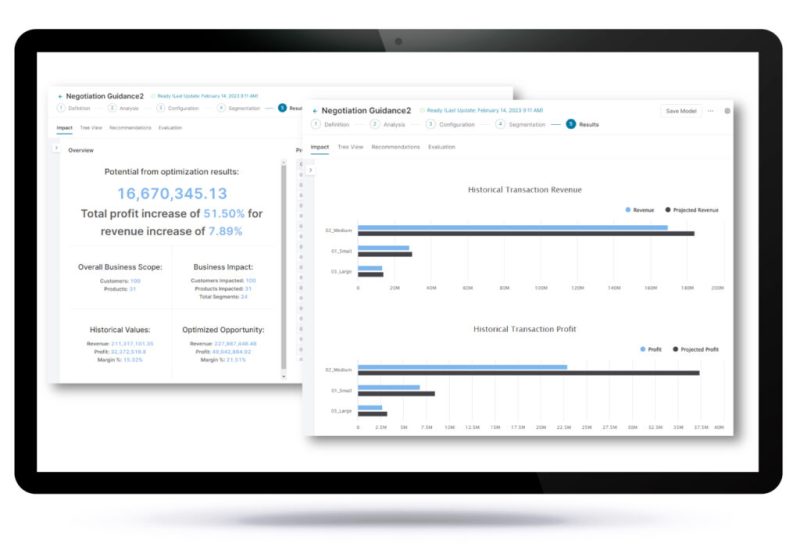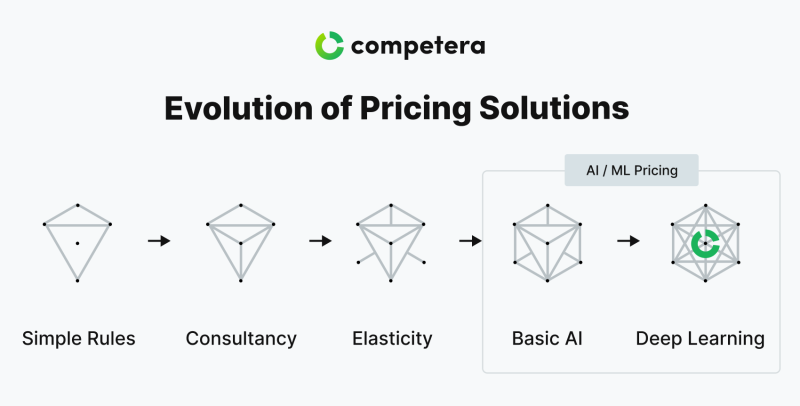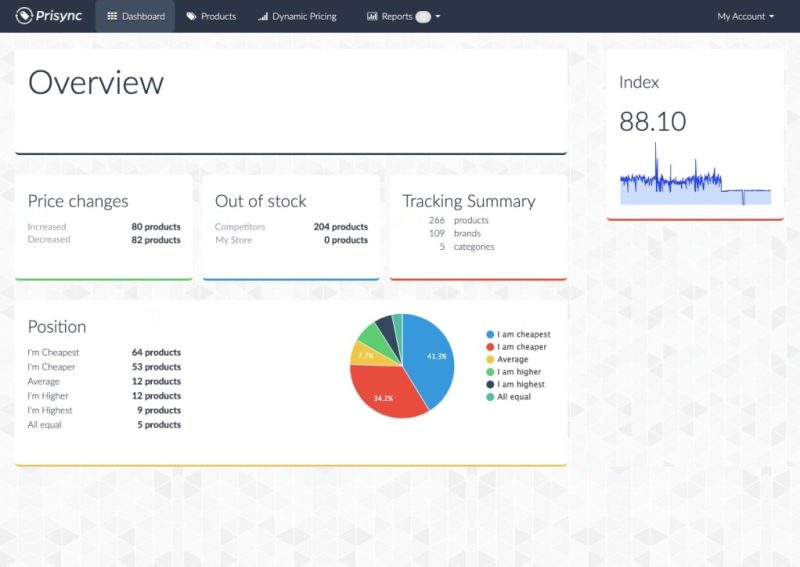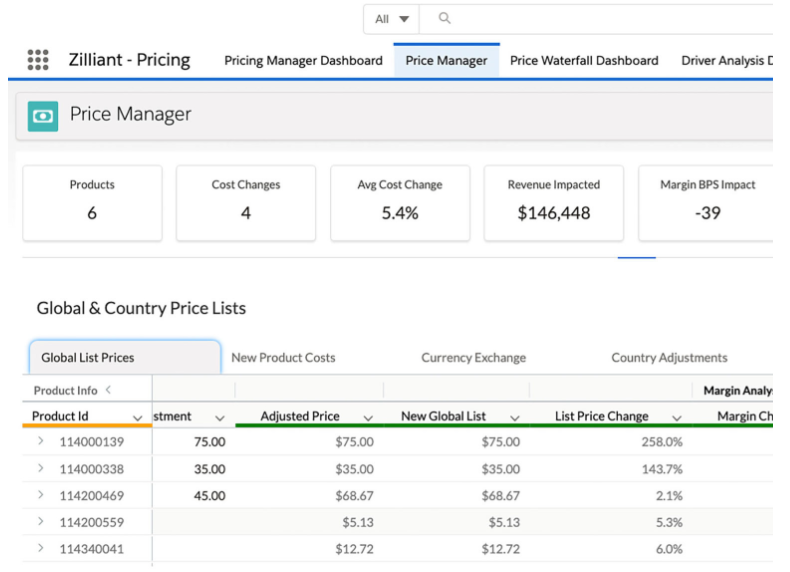Artificial intelligence-based e-commerce price management tools offer a wide range of possibilities. From suggesting prices based on market data to displaying them automatically on the store’s website. From simple analysis of historical data to forward-looking predictive analytics. So let’s look at four tools used for e-commerce price management that allow you to streamline these processes using the capabilities of artificial intelligence.
E-commerce pricing management – table of contents:
Pricefx – artificial intelligence for pricing management
Pricefx (https://www.pricefx.com/price-setting/) is a B2C e-commerce price management platform, the key part of which is a comprehensive Price Package. It lets you set, manage and optimize prices across your entire product portfolio. It employs the power of artificial intelligence to fine-tune all pricing elements and help achieve business goals with speed and accuracy. It takes into account, among other things, the cost of purchasing products, demand, pricing and the presence of competitors, price elasticity and our store’s business goals.

Source: Pricefx (https://www.pricefx.com/price-setting/)
The package includes an AI solution for price optimization, which enables the tuning of multiple pricing elements in real time, reflecting actual customer buying behavior. Key features include:
- Setting individual prices for individual customers or groups of customers,
- Dynamic real-time pricing in response to changes in market conditions, and
- Automation of the pricing process depends on the set parameters.
To take full advantage of Pricefx, you need to provide the tool with access to relevant data. Firstly, it will be important to have a product portfolio, customer base and transaction history.
Competera. Effective pricing management through demand analysis
Competera is slightly different from Pricefx. It places the main emphasis on demand analysis rather than competition. And while it has somewhat limited automation capabilities, it offers more customization options. It is also available on a subscription model.
Competera can be defined similarly to Pricefx. This is because it is a retail price optimization platform that uses artificial intelligence and machine learning to determine and maintain optimal e-commerce price positions. It works in real-time, recalculating different price combinations to increase average margins by about 6%, and its capabilities are used by Sephora and Unilever, among others.

Source: Competera (https://competera.net/resources/articles/the-journey-of-pricing-solutions)
The platform is based on deep learning algorithms that work in real-time It helps obtain optimal prices for each product across all sales channels, using a unique combination of pricing tools and AI algorithms. This makes it easy to maintain different prices depending on the sales channel.
Competera collects data from a variety of sources, including transactional data, competitive data, and market data. Machine learning algorithms then process this data to create predictive models that can be used to forecast demand and prices.
Predictive models are used to analyze data and generate price recommendations. In turn, these recommendations are based on several factors, including historical data, competitor pricing and the company’s business goals.
Competera’s biggest advantage, however, is that it can be integrated with a company’s sales and marketing systems to automate the pricing process. This helps companies to quickly and easily adjust prices to changing market conditions. Among its most important functions is pricing according to various criteria:
- demand – Competera can analyze demand data to determine how price changes may affect sales and margins,
- comparison with competitors,
- business objectives, such as increasing sales, increasing margins or increasing market share.
Competera’s recommendations can then help in automating the pricing process. It makes the company quickly and easily adjust prices to changing market conditions.
Competera is available on a subscription model. Subscription prices depend on the number of products and services a company wants to manage, as well as the level of integration with systems already in place in our store. It is also worth taking a look at materials on the principles of modern e-commerce pricing prepared by the tool’s creators. They are available on its website under the Academy tab.
Prisync – simple integrations with sales platforms
Prisync automatically collects and analyzes competitor pricing data. It can also automatically adjust product prices in the store based on business rules and a defined pricing strategy.
Thanks to the use of advanced web scraping and machine learning (ML) technologies, the data extracted is highly accurate. Above all, however, the advantage of Prisync is its integration with many e-commerce platforms, such as Shopify, Magento, WooCommerce, PrestaShop and many others.

Source: Prisync (https://prisync.com/)
Prisync also lets you customize the frequency of price tracking, market range, currencies, and product categories. Prices start at $99 for stores that want to entrust artificial intelligence with dynamic price management for up to 100 products. For 1,000 products, the price rises to $190. For large e-commerce, where management of up to 5,000 products is needed, the price is $299.
Zilliant. Pricing management for B2B
Zilliant (https://www.zilliant.com/) is a platform dedicated to B2B companies. It offers highly complex pricing management tools for both locally and internationally operating companies.

Source: Zilliant (https://www.zilliant.com/products/pricemanager)
Zilliant gives you the ability to add and price new products, handle product recalls, manage product pricing relationships and update prices due to cost changes or other competitive factors. It also enables cascading price changes across all pricing modes. It consists of several modules, the most important of which are:
- Zilliant IQ Platform – is a cloud-based platform, the foundation for all Zilliant applications, that helps companies use data to solve pricing, sales and online commerce problems,
- Price IQ – a B2B price optimization application that uses advanced AI algorithms to measure factors that influence price responses, and generates accurate price management guidance,
- Price Manager – an application for dynamic price updates when market conditions change,
- IQ Anywhere – enables integration with the store via a REST API that simultaneously pulls data from the repository and sends it to sales and customer-facing applications such as CRM, CPQ and e-commerce.
- Cart IQ – increases the average value of an online order through intelligent, real-time product recommendations.
In the context of e-commerce, Zilliant offers a set of solutions that enable B2B companies to deliver dynamic pricing and personalized sales recommendations.

Summary
As artificial intelligence and machine learning gain prominence in e-commerce, price management is becoming more sophisticated and precise. Tools such as Pricefx, Competera, Prisync and Zilliant use data analysis, predictive algorithms and automation to optimize prices in real-time allowing stores to better adapt to changing market conditions.
Shortly, we can expect even more integration of these tools with existing sales and marketing systems, enabling more personalized and dynamic pricing strategies. In addition, the use of AI technology in consumer behavioral analysis may influence the development of new pricing models that will better meet customer expectations. As a result, e-commerce pricing management will become an even more complex and efficient process that will require companies to constantly monitor and adapt.
If you like our content, join our busy bees community on Facebook, Twitter, LinkedIn, Instagram, YouTube, Pinterest, TikTok.
Author: Robert Whitney
JavaScript expert and instructor who coaches IT departments. His main goal is to up-level team productivity by teaching others how to effectively cooperate while coding.
AI in e-commerce:
- E-commerce automation. 5 areas of e-commerce worth automating using artificial intelligence
- Marketing texts for e-commerce with the help of artificial intelligence. 5 best tools
- Advertising graphic design with AI
- Customer feedback management with AI. Can Artificial intelligence take care of your online store's reputation?
- The AI revolution in e-commerce
- Personalization of e-commerce customer communication in the new era of AI
- Chatbot vs voicebot - which one to choose for e-commerce?
- AI keys to increase sales in e-commerce
- Optimizing e-commerce pricing strategy with artificial intelligence
- E-commerce pricing management. 4 best AI tools
- The future of e-commerce. What business opportunities are opening up for shopping in the metaverse?


















